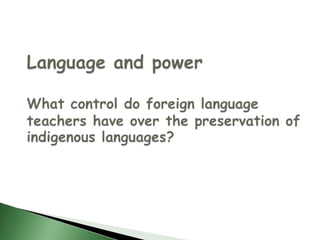Danielle pres.ppt
- 1. Language and powerWhat control do foreign language teachers have over the preservation of indigenous languages?
- 2. Teaching Spanish in a New Zealand preschool where the majority of the students come from English speaking homes. A small percentage, however, come from homes where L1 is Te Reo Maori.Context
- 3. The preschool incorporates Te Reo into its daily activities, however there is no structured language class, unlike in the case of Spanish which is offered in four, structured, half-hour sessions per week.
- 4. Some parents have expressed dissatisfaction with the decision of the preschool to promote a foreign language in this way, over Te Reo Maori.
- 5. The power issue being exploredQuestion:What are the dangers that the teaching of a dominant language poses to indigenous languages in a community?
- 6. The attitudes held by a nation/community towards their indigenous language are vital to its chances of survival.
- 7. When languages lack prestige they fall into unsafe territory (Crystal, 2000). Maori have fought hard to develop and maintain language prestige. However, Te Reo possibly lies on fragile ground. Attitudes can shift quickly, especially when another language is widely considered to be more desirable and useful internationally.
- 8. When a foreign language has been positively promoted by the dominant culture as financially and socially desirable, its teachers hold a powerful position in the influence of students’ attitudes towards indigenous languages.
- 9. From this position teachers can chose to promote positive attitudes towards indigenous languages simply by incorporating those languages into the foreign language curriculum. This could be by, for example, translating into the indigenous language rather than the dominant language where possible and appropriate, or by asking how a meaning could be expressed in an indigenous language.
- 10. “The argument is not that people should not learn a metropolitan language. The argument is that there is no necessary confrontation between this new language and the old” (Crystal, 2000, p. 88).
- 11. As teachers and language lovers, we must recognise the position of power our foreign language holds over the local languages, and we must create ways in the classroom of bridging existing inequalities.
- 12. Crystal, D. (2000). Language Death (pp. 68-90). Cambridge: Cambridge University Press.References












